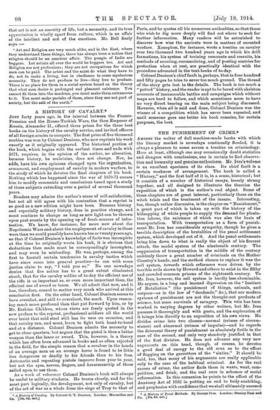A HISTORY OF CAVALRY.*
JUST forty years ago, in the interval between the Franco- Prussian and the Russo-Turkish Wars, the then Emperor of Russia, Alexander II., offered three prizes for the three best books on the history of the cavalry service, and invited officers of all foreign armies to compete. The first prize of five thousand roubles was won by Colonel Denison, who now reprints his work exactly as it originally appeared. The historical portion of the book, which begins with the earliest times and ends with 1871, requires, in the opinion of the author, no alteration, :because history, he maintains, does not change. Nor, he adds, have his own opinions changed upon the organization, armament, and employment of cavalry in modern warfare, to the study of which he devotes the final chapters of his book. Nothing which has happened since the war of 1870-71 causes him to modify comments and conclusions based upon a study of these subjects extending over a period of several thousand years.
Readers may admire the author's sense of self-satisfaction, but not all will agree with his contention that a reprint is as good as a new edition might have been. Because history and especially military history, does in practice change, and must continue to change as long as new light can be thrown upon past events by the opening up of fresh sources of infor- mation. We know, for instance, far more now about the Napoleonic Wars and about the employment of cavalry in those wars than we could possibly have known ten or twentyyears ago, 40 that if Colonel Denison's knowledge of facts was incomplete at the time be originally wrote his book, it is obvious that deductions then made must be correspondingly incomplete, and may even be misleading. He was, perhaps, among the first to foretell certain tendencies in cavalry tactics which have since come into general practice—he can with some .justice claim to say, "I told you so." No one nowadays denies that fire action has to a great extent eliminated shock, that for the cavalry soldier of to-day the efficient use of the rifle is as important as, or even more important than, the efficient use of sword or lance. We all admit that now, and it has, therefore, ceased to matter very much who arrived at this conclusion first. On the other hand, Colonel Denison seems to have overshot, and still to overshoot, the mark. Upon reason- ing much more profound than that put forward by him, or by Mr. Erskine Childers, whose views are freely quoted in the new preface to the reprint, professional soldiers all the world over insist that cold steel still has its uses on occasion, and that cavalry can, and must, learn to fight both hand-to-band and at a distance. Colonel Denison admits the necessity to get to close quarters, but argues that the pistol is then a better weapon than the lance or sword. This, however, is a theory which has often been advanced in books and as often rejected in the field, for the simple reason that a revolver in the hands of an average man on an average horse is found to be little less dangerous or deadly to his friends than to his foes. Automatic and repeating pistols improve from year to year, but not the eyes, nerves, fingers, and .horsemanship of those called upon to use them.
As a work of reference Colonel Denison's book will always be useful to military students. He traces clearly, and for the most part logically, the development, not only of cavalry, but of the art of war as a whole from-the siege of Troy to that of
• 6 History of Cavalry. By Colonel (1.7. Bouillon. louden: Macmillan and Co. [10s. 6d. net.] Paris, and he quotes all his numerous authorities, so that those who wish to dig more deeply will find out where to seek for further information. Many readers will be astonished to discover how wise the ancients were in matters of mounted warfare. Xenophon, for instance, wrote a treatise on cavalry over two thousand two hundred years ago in which his drill formations, his system of training remounts and recruits, his methods of scouting, reconnoitring, and of posting sentries for protection when at rest, are practically identical with the procedure advocated in the text-books of to-day.
Colonel Denison's chief fault is, perhaps, that in four hundred and fifty pages be tries to cover too much ground. The thread of the story gets lost in the details. The book is too much s. "potted" history, and the reader is apt to be bored with skeleton accounts of innumerable battles and campaigns which without maps are hard to follow, and which sometimes seem to have no very direct bearing on the main subject being discussed. However, when all is said and done, Colonel Denison was the winner of a competition which has never been repeated, and until someone goes one better his book remains, for certain purposes, the best.










































 Previous page
Previous page